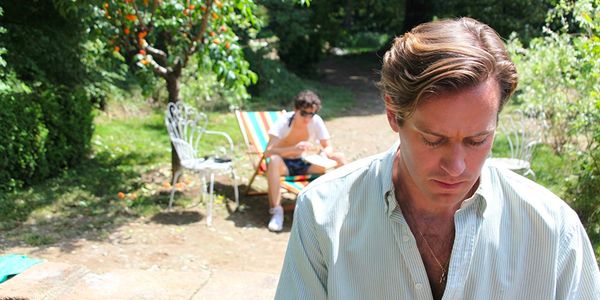CALL ME BY YOUR NAME: Of Bright & Beautiful Summer Days

Tomas is a chronic cineaste who studied English literature in…
From the moment Chen Li’s handwritten title cards appear on the screen, set against a desk of ephemera that includes archaeological statues and soundtracked to the sound of two pianos tinkling in harmony (the first movement of John Adams’ “Hallelujah Junction”), Luca Guadagnino’s Call Me by Your Name lays out its blessings in full view. They are numerous and rich, and gently exhort us to fall into the reveries of one sultry Italian summer long ago, when the arrival of a man (Armie Hammer) turned the life of another (Timothée Chalamet) upside down.
But it was not chaos that Hammer’s Oliver brought to the Perlman household. It was love, both tender and true. Like the ripe peach that Chalamet’s young Elio plucks from the garden late into the film, so, too, does he pluck the fruits of a sexuality he must come to accept, embrace, and cherish. He must pluck the flighty Oliver from his perch and find the one way to his heart, all the while keeping his cool and betraying his sentiments to the world. In 1983, there is still a danger in straying from the heteronormative condition.
“Is it better to speak or die?”
Much like André Aciman’s novel, Guadagnino and screenwriter James Ivory divide Call Me by Your Name into different sections (albeit invisibly). The first covers roughly the first hour, during which Elio and Oliver get a feel for each other’s personalities and slowly begin to develop a mutual affection for each other. At first, Elio is bemused by this new intruder, who usurps his bedroom and struts around with a peac*ck’s vanity. Chalamet here is restless and guarded, while Hammer is inscrutable—sometimes cheerful and kind, and other times distant.

The piano-laden soundtrack does a beautiful job of capturing the essence of this cautious pas-de-deux. When there is curiosity on Elio’s part, the accompanying music is light and fickle. When he wants his own peac*ck feathers to flair, Elio sits down at the piano and bangs out a few personal variations on Bach, holding court in the mastery of music as much as Oliver holds court in the mastery of philosophy and academia. See me as your equal, Elio wishes to say. See me as the person you would want to spend every minute of every single day with.
In the novel, Elio is rather introverted. Chalamet interprets the character slightly differently, imbuing him with a kind of spiritedness that stops just short of candour. During breakfast, he is unafraid to tap aggressively at his hardboiled egg when Oliver is conversing at the table. But when Oliver gives him an impromptu shoulder massage after playing volleyball, Chalamet tenses up and registers nothing but surprise and confusion on his face. He cannot articulate his appreciation at this physical contact. Yet if he wants Oliver’s body, he must articulate. He must speak.
“Because I wanted you to know”
Inspired by a German fairy tale read to him by his mother (Amira Casar), Elio does eventually speak. This is the way Call Me by Your Name’s second section begins, initiated by a heavily coded conversation between Elio and Oliver during a trip to the town square. Elio professes to know nothing about “the things that matter.”
When Oliver tries to extract something more precise, Elio merely replies with “You know what things.” Oliver intuits his meaning, but in his reply (“Why are you telling me this?”), there is a guardedness that signifies its perils. And Elio’s articulation instantly returns to a dimension of concealment when he says, “Because I thought you should know.” The verb assumes an auxiliary function by habit, and when the conversation sputters to a halt, Elio immediately realizes his mistake, thrice repeating the phrase he should have used: “Because I wanted you to know.”

In this second section, the should of propriety now dissolves into the want of desire. The performances become inverted: Chalamet relaxes around Hammer, while the latter now puts up his guard. What has been heretofore unspoken and unexpressed is gradually manifested as the comfort levels of Elio and Oliver increase around each other, signalled by Elio’s first impulsive actions: grabbing Oliver’s crotch, then kissing him on the lips. When this occurs, the two have only swum, biked and walked together. The expression of physical desire must happen in a new setting: a gorgeous and sunny berm tucked out of the public’s way, where Elio goes to be alone. Now, by inviting Oliver to this sacred space and signalling his love, Elio finally consents that the two of them can now become a single unit.
The only obstacle is Oliver’s assent. Elio has done his part in substituting the should for his want. Oliver must do the same. It takes him a few days, and in this interim, the first crackles of Chalamet’s bravura performance are evidenced. The pain of possible rejection wafts over his physicality as Oliver actively avoids his company. When the plaintive notes of Sufjan Stevens’ “Futile Devices” emerge from the ether, the aching lyrics are juxtaposed with Chalamet’s downtrodden visage as he sits alone in the twilight at the front of his family’s villa. He fingers Oliver’s Star of David necklace, which is the only thing that he can touch until Oliver makes his truth known.
“Call me by your name, and I’ll call you by mine”
Eventually, Elio must write Oliver a note. The response is swift: a midnight meeting in Oliver’s room. The sequence depicting Elio’s restless day is a spectacular achievement, which is filled with so many anxious glances at wristwatches and clocks. In one of Call Me by Your Name’s many giddy moments of teasing, Oliver devilishly asks Oliver if he’s got the time, which transposes the rush in Elio’s blood into our own.
Even an afternoon of sex with his girlfriend Marzia (Esther Garrel) cannot dissipate the ticking of the temporal threshold that dominates Elio’s environment. Once again, Chalamet’s performance is electric as he conveys Elio’s nervousness and impatience with the right mixture of comedy and doleful adolescence.

When midnight comes, the two are ready. If there are butterflies in their stomachs, they are soon dissipated when Elio places his foot on Oliver’s—and Oliver reciprocates. This is the moment of assent that Elio has been waiting for. The moment Oliver, who has weighed the factors and assessed the risks, decides that his feelings for Elio can no longer remain veiled in mock indifference.
When they finally consummate their relationship, Guadagnino pans to the bedroom window—but not out of prudishness. It is rather a normalizing gesture, since for time immemorial, a pan away from the lovemaking couple has been a traditional feature in cinematic romances. It is to give them their privacy, as well as to give our imaginations a stake in the process.
Here, Guadagnino seems to say, the love of two men now belongs in that tradition. Desire is not always dependent on whatever is made explicit, and here, it is enough to imagine the intensity of love that no actor—not even actors as extraordinary as Chalamet and Hammer—can reproduce as convincingly as two people so madly in love as Elio and Oliver are.
“To feel nothing so as not to feel anything—what a waste!”
The third and last section of Call Me by Your Name, which deals with the final days of Elio and Oliver’s romance before Oliver has to return to America, is one which a review like this cannot do much justice. What I have tried to do in the preceding paragraphs is to give you a sense of how richly structured Call Me by Your Name is in its handling of Elio and Oliver’s courtship, and how necessary it is that the film doesn’t rush its development. Once that stage is reached, the unmitigated beauty of this film unfurls like a petal in spring, and it is best to witness it firsthand.
Scenes like Elio’s sexual experiment with the peach, and Elio and Oliver’s joyous three-day romp in Bergamo, are ones that are propelled by a sheer emotional undertow, erotic or otherwise. They cap what has been 90 minutes of contentious battle and confusion. Now, bliss and tranquility are allowed to rule the day, and we have a share in these feelings: we have all experienced that moment of triumph over particularly difficult conquests before. The nature of these scenes is to allow us to lap up the adrenaline and feel the rush of wonder in seeing this coupling progress to such heights.
They also prepare us for the cathartic release that comes from Oliver’s departure, which is preceded by a shot of a silhouetted Hammer looking down on a sleeping Chalamet with a look of the tenderest anguish. We see the look appear again about six or so minutes later, when Elio is being driven home by his mother. Chalamet’s face contorts. He brings his hand to his forehead as the tears well in his eyes. Our hearts are breaking in unison with his. And then, gently, quietly, his mother extends her hand and strokes the back of her son’s head. She does not need to look at him more than briefly. She knows the extent of his pain, and how heavy it hangs in the car, mixing with the smoke of the cigarette she holds in her other hand.

Elio’s parents, who are largely in Call Me by Your Name’s background during much of its runtime, play a pivotal role in the film’s epilogue. Thus far, they have allowed him to develop on his own. They have given him the leeway to make his own decisions so that his maturity develops from within his self, bolstered by his various social encounters, errors in judgment, and (like in his affair with Oliver) an astute recognition of life’s desires. But the loss of Oliver has set him adrift. They are keenly aware of it.
The heart-to-heart that Mr. Perlman (Michael Stuhlbarg) has with his son is a moment of cleansing. It is at this point where we are given free leave to cleanse our laps with our tears, because Mr. Perlman gives Elio free leave to cleanse his grief rather than to stifle it into nothingness. “What you and Oliver had was special,” Mr. Perlman says. He wishes he could have shared what they shared.
And so he urges Elio to keep his time with Oliver sacred. To keep the flame burning within him always. The pain of separation will heal, but only if it is not ripped out. In Mr. Perlman’s monologue is Elio’s tourniquet, which keeps him whole. It is one of the greatest gifts a parent can impart to their child, and Stuhlbarg conveys this selfless love with the most incredible restraint and grace.
Conclusion: Call Me by Your Name
When the credits roll, we know that Elio has listened to his father. Timothée Chalamet more or less looks right at us as Elio and relives the fairy days of Oliver’s stay on his face. It is one last astonishing apex in a film comprised of so many of them, and it is right that this one should be Chalamet’s.
He is the first, the last, and the everything of Call Me by Your Name, moving earth and mountain to depict this bright young man’s transition from a languid adolescence to a provisional adulthood. A great film lies on the shoulders of the year’s greatest performance, and perched on either side of him are the stunning turns of Armie Hammer and Michael Stuhlbarg (and, to a quieter extent, Amira Casar and Esther Garrel).
Luca Guadagnino is thinking of sequels, and there is material from the novel that could provide a basis for future extensions of this story. Even if nothing else materializes, Call Me by Your Name will still stand tall amongst its contemporaries for its potency and lyricism, delving with an effortless thrall into the lives of two men who were changed for the better and for good (as lyricist Stephen Schwartz once wrote) as soon as their paths crossed. Whether it was the last happy summer for Elio, or the first of many, we may never know. But the fact that it was happy is enough. For him, for Oliver, and for us.
What are your favorite summertime romances as depicted in film? Let us know in the comments below!
Call Me by Your Name is currently in limited release in the US and the UK. For more international release dates, click here.
Does content like this matter to you?
Become a Member and support film journalism. Unlock access to all of Film Inquiry`s great articles. Join a community of like-minded readers who are passionate about cinema - get access to our private members Network, give back to independent filmmakers, and more.
Tomas is a chronic cineaste who studied English literature in university (in both the undergraduate and graduate levels), and hopes to pursue a career in writing. His passion for film began in earnest at the beginning of the 2010s, and since then he's been reveling at the vast horizons of the cinematic landscape like a kid at the proverbial candy store.












